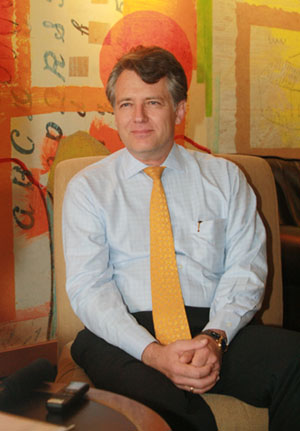
|
REGIONAL> Highlights
 |
|
Interview with Joerg Wuttke, Chairman of EUCCC
By Wu Yong and Liu Ce (China Daily Liaoning Bureau)
Updated: 2009-06-30 16:08 Editor’s notes: Based on the need of the European Union and local European businesses to find a common voice for the various business sectors, the European Union Chamber of Commerce in China (EUCCC) was originally founded by 51 member companies based in China in 2000. Now the chamber has a total of more than 1,300 members in eight cities: Beijing, Chengdu, Nanjing, the Pearl River Delta (Guangzhou and Shenzhen), Shanghai, Shenyang and Tianjin. The Chamber is recognized by the European Commission and the Chinese authorities as the official voice of European business in China. Recently, Joerg Wuttke, chairman of the EUCCC, visited Shenyang, capital of Liaoning province, to hear the voice of EU companies in the city. China Daily reporters Wu Yong and Liu Ce spoke with him on the topic of investment climate.
 Q: You’ve been inChinafor over 20 years, so how do you like the country? What’s your opinion onChina’s investment climate? What are the best and worst things about the country’s investment climate? A: I came toChinafor the first time in 1982. I’ve been living in China since—more than 25 years. Of course, that indicates how much I love the country and how much I grew up with the country. I’ve seen numerous changes in the 25 years and I saw the state’s economy going to a more open market-oriented one. And of course investment climate for business is so much better. And the economy is totally different from 20 years ago, so the investment climate has much been improved. The best are two things: first is the obvious economy growth ofChina. The second is the people. The people ofChinaare hospitable, hard-working and extremely smart. That’s made doing business here very easy. The problem is that there is still much heavy state interference in the economy. Q: There are also many European companies inShenyang. Can you comment on the investment climate of the city? A:Shenyangitself has lots of investment plants and we have many members here, including BMW, Michelin and so on. I have known the city since 1996. It’s a long time, and it develops very fast. The best thing is the people. People here are very highly-educated and very hard-working. But again, the transparence is very difficult. So I think there’s much room to be improved. Q: What’s the most difficult thing in the negotiation between foreign companies and the government? What’s your advice for the local government? A: The most important thing for foreigners here is having a good living environment. And the problem I heard most was the medical situation for foreigners. We don’t have doctors who can speak our languages.Shenyanghas great hospitals but they can’t service foreigners. So investment situations are taken, like do you have schools, do you have a nice environment, do you have good medical facilities? For the government it is very easy. They keep excellent hospitals in Shenyang. The problem is the shortage of facilities capable for foreigners. There should be some engagement from the government. This is a real investment drive force. Q: During the financial crisis, what did the EUCCC do to help foreign companies run their business inChina? A: We brought good speakers to the platform to talk about the economy and what they expected. Also, we did a survey which lasted for three weeks [on how] companies responded to the crisis. So maybe you can learn from it. Q: What are the focuses of the EUCCC in the future? A: It’s interesting for us to see how much information and synergies we can get. EU Chamber should putLiaoningon the investment map that we can all benefit from. And I talk about not only economic benefits but also the investment climate, like how people live here. Because there are still so many employees of foreign companies in Shenyang who have their families inBeijing. They fly up on Monday and fly down on Friday, which is not good for a family. It should encourage the city to make living easier for people |